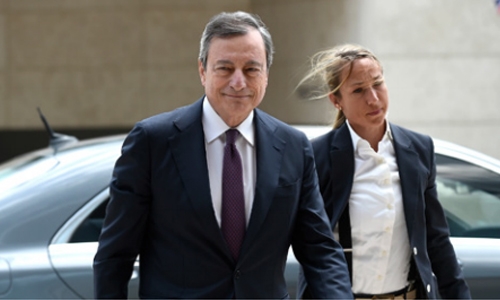‘Super Mario’ sends stock markets skyward
European Central Bank Mario Draghi sent Europe’s stock and bond markets surging yesterday by hinting at further eurozone interest rate cuts, while the euro fell sharply on the news. Draghi’s dovish comments even sparked the fury of US President Donald Trump, who accused the ECB chief of sending the euro down against the dollar to make it “unfairly easier for them to compete against the USA”.
Equity investors rejoiced, with Paris stocks soaring 2.1 per cent, London up 1.3pc and Frankfurt leaping 1.8pc in afternoon trade. “Super Mario is back!” said IG analyst Chris Beauchamp in summary at the market action. “Despite only having a few months left to his tenure, the head of the ECB has handed his successor a firmly dovish bias, as he leaves the door open to more QE (quantitative easing stimulus) and renewed negative rates at the ECB in order to try once again to kick-start the eurozone economy.”
Ahead of a key US monetary policy decision, Draghi renewed openness to lowering eurozone interest rates still further, as well as other steps to boost the bloc’s anaemic growth and inflation. “Further cuts in policy interest rates and mitigating measures to contain any side effects remain part of our tools,” Draghi told the ECB’s annual economics gathering in Sintra, Portugal. Central bank governors had already discussed potential rate cuts at a regular meeting of the ECB’s governing council in early June, faced with an economy weighed down by trade conflicts making for sluggish price growth.
The prospect of falling interest rates tends to push share prices higher because they cut company borrowing costs and also boost consumers’ disposable incomes. It also tends to buoy bond markets, which reacted strongly, with the yield on the French government’s benchmark 10- year bond turning negative for the first time.
Fed rate cut hints?
Wall Street followed Europe’s lead, opening higher ahead of a Federal Reserve meeting which is expected to give further hints about what would be the central bank’s first rate cut in more than a decade. The Fed has raised rates nine times over the last three and a half years as the economy recovered and put millions of Americans back to work. Investors are also gearing up for next week’s high-stakes G20 summit, where Trump is set to meet his Chinese counterpart Xi Jinping on the sidelines to discuss their trade war.
“So much has been priced in at this stage that it’s going to be tough for the (US) central bank to live up to market expectations,” Oanda analyst Craig Erlam told AFP. “Ultimately, how they see the year out will likely largely depend on trade talks between the US and China, with the next opportunity to overcome the impasse being the G20 next week.” While trade war tensions continue to make waves, the key focus for now is what the Fed plans to do with monetary policy as the tariff stand-off shows signs of impacting the world’s top economy.
The latest weak data include construction of new homes dropping in last month, as well as manufacturing activity in New York hitting its lowest level since late 2016. Oil prices were also affected by Draghi’s comments, rebounding from earlier losses to solidly positive gains. On currency markets, the pound remained under pressure on growing worries that arch-Brexiter Boris Johnson will be elected leader of the ruling Conservatives and thus prime minister, and pull Britain out of the European Union without a divorce agreement.
Sterling is at five-month lows ahead of the next round of the party’s leadership vote Tuesday -- and before Thursday’s monetary policy update from the Bank of England.
Related Posts

